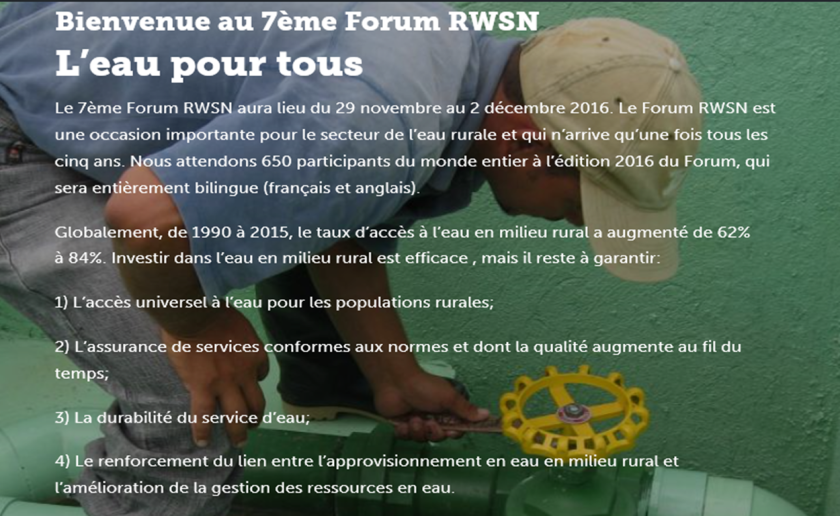 Il ne reste maintenant plus que deux mois avant le 7ème Forum RWSN à Abidjan. La plupart des auteurs des présentations, posters et films ont maintenant été informés du statut de leurs soumissions, et nous progressons bien du côté de la logistique également. Je dois également remercier notre cinquantaine d’évaluateurs qui ont fait preuve d’un superbe esprit d’équipe, ainsi que les organisateurs des séminaires sponsorisés qui ont su collaborer ensemble. Et un grand merci à nos généreux sponsors du Forum pour faire en sorte que nous puissions organiser cet évènement. Je suis vraiment ravie de voir une telle ouverture entre organisations pour organiser des sessions conjointes à travers lesquelles les participants du Forum seront en mesure d’apprendre les uns des autres et partager leurs expériences.
Il ne reste maintenant plus que deux mois avant le 7ème Forum RWSN à Abidjan. La plupart des auteurs des présentations, posters et films ont maintenant été informés du statut de leurs soumissions, et nous progressons bien du côté de la logistique également. Je dois également remercier notre cinquantaine d’évaluateurs qui ont fait preuve d’un superbe esprit d’équipe, ainsi que les organisateurs des séminaires sponsorisés qui ont su collaborer ensemble. Et un grand merci à nos généreux sponsors du Forum pour faire en sorte que nous puissions organiser cet évènement. Je suis vraiment ravie de voir une telle ouverture entre organisations pour organiser des sessions conjointes à travers lesquelles les participants du Forum seront en mesure d’apprendre les uns des autres et partager leurs expériences.
C’est vous – les participants qui ont soumis des contributions, ainsi que les organisations développant le programme des séminaires sponsorisés du vendredi – qui êtes en charge du programme. Il y aura des sessions sur la durabilité des services; le développement des eaux souterraines et des puits; l’égalité, la non-discrimination et l’inclusion; l’auto-approvisionnement et la cartographie et le suivi. Nous allons mettre les articles en ligne au fur et à mesure que le programme se consolide, donc continuez à aller vérifier le programme sur notre site. Le Forum RWSN est aussi une plateforme pour construire son réseau. Les réservations des stands pour l’exposition continuent à progresser, donc n’hésitez pas à nous contacter si vous aimeriez avoir un stand. Nous avons permis à des petites organisations de partager un stand dans le passé, donc si cela peut être une option pour vous, n’hésitez pas à nous contacter.
Vous vous demandez peut-être – qui sont les participants du Forum RWSN? Nous attendons entre 300 et 600 participants. Le nombre de participants dépend de vous – les 8500 membres du réseau RWSN, et des autres qui pourront nous rejoindre par la suite. Près d’une centaine de participants ont déjà confirmé et payé leur inscription. Cela inclut des membres de haut niveau du gouvernement, des professionnels du secteur du développement, de la société civile, du secteur privé et de la recherche. Le Forum RWSN est le seul évènement ou vous pourrez rencontrer un tel kaléidoscope de personnes et de perspectives sur l’eau en milieu rural et dans les petites villes. Nous vous encourageons vraiment à venir nous rejoindre!
Nous savons également d’expérience qu’il y a tendance à s’inscrire à la dernière minute. Nous vous demandons de vous inscrire maintenant pour éviter d’être déçu. Je suis sûre que vous pensez déjà que participer au Forum est une bonne chose pour vous professionnellement, et pour votre organisation, mais peut-être qu’il vous semble difficile de trouver le temps et l’argent pour participer. Nous avons mis au point un guide (en anglais seulement pour l’instant; nous mettrons la version française en ligne prochainement) qui peut vous aider à argumenter auprès de votre hiérarchie ou de sponsors potentiels que participer au Forum RWSN est une opportunité à ne pas manquer.

 The
The 



